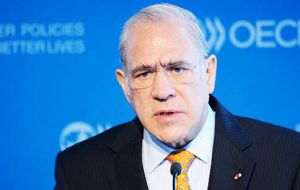MercoPress. South Atlantic News Agency
OECD optimistic about global growth; anticipates strong performance of Argentine economy next year
 “The global economy has the prospect of modestly higher growth, after five years of disappointingly weak outcomes,” said OECD Secretary General Angel Gurria.
“The global economy has the prospect of modestly higher growth, after five years of disappointingly weak outcomes,” said OECD Secretary General Angel Gurria.  OECD based US projections on expected fiscal stimulus from the incoming Trump administration, that plans to back large-scale infrastructure projects.
OECD based US projections on expected fiscal stimulus from the incoming Trump administration, that plans to back large-scale infrastructure projects.  OECD estimates that the full impact of the reforms introduced by the administration of president Mauricio Macri will be felt during 2017
OECD estimates that the full impact of the reforms introduced by the administration of president Mauricio Macri will be felt during 2017 Fiscal initiatives could boost global economic growth, the Organization for Economic Cooperation and Development (OECD) said Monday in its semi-annual economic forecast. The Paris-based think tank predicted a global gross domestic product (GPD) growth rate of 3.3% in 2017, a figure that remained unchanged from its last outlook released in June.
It also forecast 3.6% GPD growth in 2018, a rate that would end years of sluggish growth. The projection was backed by strong growth outlooks for the US, Argentina, Brazil and South Africa.
“The global economy has the prospect of modestly higher growth, after five years of disappointingly weak outcomes,” said OECD Secretary General Angel Gurria.
“In light of the current context of low interest rates, policymakers have a unique window of opportunity to make more active use of fiscal levers to boost growth and reduce inequality without compromising debt levels,” he added.
The OECD based its US projections on expected fiscal stimulus driven by the incoming administration of Donald Trump, who has said he would back large-scale infrastructure projects.
Argentina is forecasted to expand 2.9% next year and 3.4% in 2018, but will end the current fiscal year with a contraction of 1.7%. This is because of a drop in consumer spending and lesser purchasing power from households, however business confidence has experienced a “significant boost”.
Part of the improved confidence atmosphere is referred to the reformed stats office, Indec, which has become more transparent, more reliable and trustworthy, helping the Central bank achieve inflation targets.
The current contraction is linked to a weak global demand for commodities and lower international prices, and Brazil's deep recession which is Argentina's leading trading partner particularly in manufactured goods, such as the auto industry.
OECD estimates that the full impact of the reforms introduced by the administration of president Mauricio Macri will be felt during 2017 helping to lower unemployment which now stands above 9%, and a gradual reduction of inflation.
However OECD also points out that there is not much fiscal margin to promote growth because of the huge budget deficit and calls for a gradual but steady fiscal consolidation, avoiding social impacts. Improvements in the tax revenue system should help to lower fiscal pressure for companies, as well as redirecting government spending to public works investment.
The report on Argentina underlines as achievements by the current administration, the unification of the money exchange rate market, normalizing relations with creditors both globally and domestically, as well as a notorious improvement of transparency and governance.




Top Comments
Disclaimer & comment rules-

-

Read all commentsOECD has about as much credibility as the IMF. :o(
Nov 29th, 2016 - 06:06 pm 0Really?
Nov 29th, 2016 - 07:25 pm 0“Strong performance of Argentine economy next year?”
Let's see what's on other headlines:
Focus Economics:
Consumer sentiment deteriorates in November
Exports contract further in October
Economic activity contracts sharply in September
Buenos Aires inflation jumps in October on higher prices for gas
Buenos Aires Herald:
Economic activity down 3.7% in September
Consumption of domestic goods down 8.8 percent in Q3
Trading Economics:
External Debt in Argentina increased to an all-time high 188 USD Billion in the second quarter of 2016.
In the first quarter of 2016 it was 163 USD Billion.
External Debt in Argentina averaged 137 USD Billion from 1994 until 2016.
(Debt interest payments have now become a relevant part of Argentina's annual budget).
CNBC:
“Macri won office on promises of attracting foreign investment and reducing poverty, but the anticipated influx of investments has been slower than hoped...reducing subsidies for home-heating natural gas, have contributed to inflation, limiting Argentines' purchasing power.
But don't dispair. The same CNBC article ends with a note of optimism: ”Argentina's gross domestic product is expected to shrink 2 percent in full-year 2016, before rebounding to grow 3.2 percent next year, according to private estimates.”
In Macri's Argentina, the only positive numbers happen sometime in a hypothetical future. The present and the actual numbers remain grim.
Commenting for this story is now closed.
If you have a Facebook account, become a fan and comment on our Facebook Page!